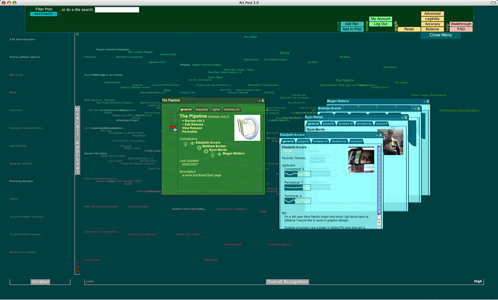 The Pool is one of the software packages showcased in Trebor Scholz’s 2011 anthology Learning Through Digital Media: Experiments in Technology and Pedagogy, along with Facebook, Tumblr, and Second Life. Available as a printed or eBook, the text surveys “how both ready-at-hand proprietary platforms and open-source tools can be used to create situations in which all learners actively engage each other and the teacher to become more proficient, think in more complex ways, gain better judgment, become more principled and curious, and lead distinctive and productive lives.”
The Pool is one of the software packages showcased in Trebor Scholz’s 2011 anthology Learning Through Digital Media: Experiments in Technology and Pedagogy, along with Facebook, Tumblr, and Second Life. Available as a printed or eBook, the text surveys “how both ready-at-hand proprietary platforms and open-source tools can be used to create situations in which all learners actively engage each other and the teacher to become more proficient, think in more complex ways, gain better judgment, become more principled and curious, and lead distinctive and productive lives.”
In A Path towards Global Reach, Craig Dietrich describes The Pool as software that empowers students rather than subjugating them:
A classroom environment where students can review their peers, build project foundations with each other, and distribute their work to Internet-based audiences has the potential to turn the tables of authority on the instructor. Blackboard is a panopticon: a top-down system that channels all views into an authoritative watchtower. The Pool, by contrast, is a heteroglossia: a place where multiple voices emerge.
In her review of the “A Path towards Global Reach,” Kim Chang fine-tunes the contrast between software for classroom management versus education, focusing on The Pool’s peer-to-peer dynamic:
Much like a public swimming pool, any user with an design idea was able to jump in and share their project ideas and goals. Other contributors would then draw on their own expertise and comment/make suggestions on the other projects and these projects would subsequently get ranked based on the feedback received. As I understand it, students were able to get a lot of input from their peers and teachers at all stages of their individual projects. They were encouraged to refine and borrow ideas from multiple sources and were able to actively engage and evaluate their peers….
I can see this type of software being very useful for when students might need to organize a presentation or maybe to share bibliographic sources and get feedback on research projects. I really like the idea of students being able to critique/comment on each others work from inception to execution and think that this type of system would encourage well planned and thoughtfully executed projects rather than things thrown together at the last minute.
